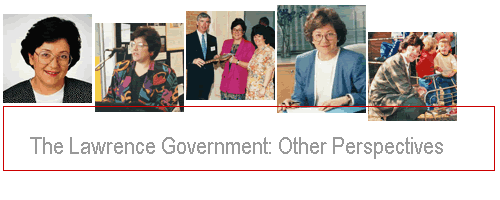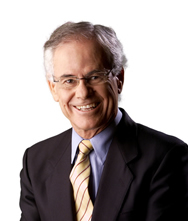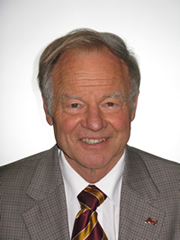
 |
||||
Peter Kennedy
Peter Kennedy was appointed Adjunct Professor in the School of Arts and Sciences at Notre Dame University in Fremantle in 2011, after a 41-year career in journalism, during which he became recognised as one of WA’s leading political journalists. He is a graduate of the University of Western Australia, and was a high school teacher and lecturer before starting in journalism at The West Australian in 1970. After joining The Sydney Morning Herald in 1977, he held several posts including the paper’s State political correspondent in Sydney and chief-of-staff of the Canberra Press Gallery bureau. He worked as press secretary to Deputy Premier Mal Bryce in Perth before joining the ABC in 1990 as presenter, political reporter and analyst. In 1995 he was awarded the Clarion Prize by his peers for an “outstanding contribution to journalism”.

Peter Kennedy.
Photograph courtesy
Parliament of Western Australia
The circumstances in which Carmen Lawrence became Australia's first female Premier dogged her three year term in the job, and some of her decisions haunted her through the rest of her 21-year political career.Dr Lawrence won the marginal seat of Subiaco in 1986 and had a meteoric rise. She gained Cabinet rank within three years in the Education and Aboriginal Affairs portfolios, and just over a year later was sworn in as Premier after a coup against the incumbent, Peter Dowding. He had lost support, partly because of his abrasive style. It was not a good time to take over the reins in WA. She still had to grapple with the continuing fallout from the dealings with business of her predecessors, Mr Dowding and Brian Burke, and the State was strapped for cash. She eventually yielded to mounting pressure for a royal commission into the dealings -- known as "WA Inc" -- which produced sensational national headlines for two years. Sections of her party have never forgiven her for that decision. She ran a tight ship as Premier and campaigned tirelessly, attending countless meetings and forums around the State. It was no surprise Labor lost office in 1993, but the defeat was nowhere near as severe as many expected.
Dr Lawrence transferred to the Federal Parliament after Labor Treasurer John Dawkins' surprise decision to quit his safe seat of Fremantle in early 1994, and was quickly promoted as Human Services and Health Minister. But some unfinished business - which became known as the "Penny Easton affair" -- from her days as Premier dogged her. Her credibility was challenged at a royal commission into the issue, and she was ordered to stand trial for perjury. She was cleared but if the purpose of Richard Court's Government was to tarnish her reputation and ensure she never became federal Labor leader, it succeeded. She did serve a term as Labor's national president.
Carmen Lawrence was a politician of undoubted ability and was a widely respected Premier. But she was promoted far too quickly in the State Parliament by a party which was clearly in damage control and saw her as the best bet to calm troubled waters. She inherited problems created by others, although she largely did a good job steering through those hazards.
But the virtually unprecedented action of the Court Government in pursuing an opponent after she had left the State scene took its toll on her credibility, despite being cleared of the charges.
Harry Phillips
Dr Harry Phillips is an Honorary Professor at Edith Cowan University and an Adjunct Professor at Curtin University. He is a prominent political analyst providing regular media commentary, a role in which he covered the period of Carmen Lawrence’s ministerial parliamentary career.
Carmen Mary Lawrence was born on 2 March 1948 at Northam in Western Australia, daughter of Ernest Richard Lawrence, a farmer, and his wife Mary Norma nee Watson. She spent her childhood in the wheatbelt town of Gutha and was educated at the Dominican Ladies College in Dongara and Marian Convent in Morawa before completing her high school education at Santa Maria College in Attadale from where she won a General Exhibition and a Special Subject Exhibition in Economics.
Between 1965 and 1968 she completed a Bachelor of Psychology degree at the University of Western Australia with first class honours and completed her Ph D in 1983. During the course of her studies she won numerous prizes including the J A Wood prize in 1968 for the most outstanding graduate in a group of faculties including Arts, Economics and Commerce and Law.
Carmen Lawrence stands as one of the most formidable women in Australia’s political history. To cast more light on her career a comprehensive biography is awaited to include her rural Catholic schooling, her brilliant academic record, public political life and return to university employment. When she became Premier of Western Australia on 12 February 1990 she was the first woman to occupy that office, perhaps fitting for a person who was a strong advocate of equal opportunity. Her rise to the top had been rapid. Although she lost her first electoral contest when she stood for East Melville in 1983, at the next State election three years later she became the first Labor candidate to win the seat of Subiaco for thirty years. She had defeated the well known Ross McClean, the former federal Liberal MHR for Perth. Following an electoral redistribution she won the new seat of Glendalough in 1989 before leading Labor at the 1993 poll.
While Labor lost government it was widely contended that Lawrence’s campaign performance had minimised the electoral losses the party was facing in the wake of the Royal Commission into Commercial Activities of Government and Other Matters (1992). Often abbreviated as the ‘WA Inc.’ Royal Commission, it had depicted aspects of the system of government as ‘dysfunctional’. Carmen Lawrence, within a year resigned her post as the Western Australian Leader of the Opposition to successfully win the Federal seat of Fremantle in March 1994 to soon be appointed Human Services and Health Minister in the Keating Labor government. This made her the first woman to be a member and minister in both the State and Federal Parliament. Her career in Canberra was then shadowed by the Kenneth Marks Royal Commission (1995), which investigated what was known as the Penny Easton Affair, which pertained to a series of events in the presentation of a petition to the Legislative Council before the 1993 election. Not until July 1999 was Lawrence acquitted of all charges by a District Court jury but it had diminished any prospect of her becoming Federal Labor leader. Later she served a term as Labor’s National President.
From her beginnings in the Legislative Assembly Carmen Lawrence soon became known for her public speaking skills with Hansard reporters rating her one of the best parliamentarians for her speeches, which were delivered with considerable speed. She quickly assumed a prominent parliamentary committee role and then became the Minister for Education and Aboriginal Affairs after Peter Dowding had become Premier when Brian Burke relinquished the office in February 1988. Then within a year Carmen Lawrence had been thrust into the Labor Party leadership and Premiership. Another year later in an attempt to place her stamp on the government she dismissed three ministers namely: Jeff Carr (Mines, Fuel and Energy), Gavin Troy (Productivity and Labour Relations) and Pam Buchanan (Works). They were replaced on 5 February 1991 by Eric Ripper (Community Services), Jim McGinity (Housing, Construction, Services and Industries) and Dr Judyth Watson (Aboriginal Affairs, Multi-Cultural Affairs and Ethnic Affairs). The latter had shared with Lawrence the distinction of being the first to hold a Ph.D, when first elected to Parliament.
Party discord emanated from the ministerial changes. Pam Buchanan resented the way Premier Lawrence handled the changeover and resigned from the Labor Party to sit on the cross benches as an Independent. Jeff Carr soon resigned from Parliament in late February 1991 leaving the government with an unwinnable by-election for the seat of Geraldton. Gavin Troy remained in the party but ceased to attend caucus meetings. Thereafter Left-wing Labor member Ian Alexander joined Buchanan on the cross benches in February 1991 with colleague Frank Donovan, becoming an Independent from October in the same year. Donovan was particularly dissatisfied with party stance on assistance to Notre Dame University and at the Federal level, the pursuit of the Gulf War. These developments left Carmen Lawrence leading a minority government throughout 1992 before the election in February 1993.
The disappointed Jeff Carr later wrote a book titled I Do Recall. This was an ironic reminder of the phrase ‘I don’t recall’ which Carmen Lawrence employed when being questioned about some of her recollections at the Marks Royal Commission. In Carr’s opinion, when Lawrence was elevated to the Premiership, and handicapped by inexperience, her government gradually lost direction as it became increasingly guided by opinion polls. While it was Carr’s view ‘that any politician worth his or her salt has to have a vision and be prepared to stand up and argue for what he or she believes, irrespective of what the polls say’, Carr then observed that when Carmen Lawrence resigned from the Labor Federal shadow front bench in December 2002, under the leadership of Simon Crean, she spoke of him being too poll driven. Lawrence’s own poll ratings as Premier had remained sufficiently high to force the Liberal Party to replace their leader Barry McKinnon with Richard Court in May 1992. At this time the Lawrence government had been particularly active with new policy initiatives.
Whether in majority or minority government Carmen Lawrence led a ministry which sought to open new policy frontiers. In February 1992, two years after ascension to the Premiership she announced a ‘WA Advantage Package’ designed to ‘reposition Labor as a partner of the WA business community’. Some privatisation plans, cast with consideration of Labor values, included the sale of the State Government Insurance Office (SGIO) and up to forty nine percent of the Rural and Industries Bank (later Bankwest). Plans were also announced for the extension of the of the metropolitan rail network to Rockingham and Mandurah. An amendment to the Mining Act was contemplated to remove the power of veto of private landowners. Provision was made for enterprise agreements in the State’s Industrial Relations Act and steps were formulated for the proposed corporatisation of Midland workshops and an integration of the urban rail division of Transperth. The northern suburbs railway line to Joondalup, which had proceeded throughout Lawrence’s term as Premier, was officially opened just prior to Christmas 1992.
The second stage of WA Advantage, the ‘Social Advantage Package’ had also been launched in May 1992. It included programmes for children, the family and the community. A new Youth Justice Bureau was to identify potential juvenile offenders through early intervention. Juvenile crime, involving a number of high speed chases and deaths, had received considerable media attention and was responded to by Lawrence and Deputy Leader, Ian Taylor, with the passage of the Crime (Serious and Repeat Offenders) Sentencing Bill 1992. Although this Act was repealed as early as June 1994, with an admission from Lawrence that it was a mistake, the ‘WA Advantage Package’ was widely welcomed by the community organisations. There were some complaints about the lack of consultation with affected groups. Lawrence, though, with her writings and considerable community involvement, had always been an advocate of civic participation and better political and legal education.
Unfortunately for Carmen Lawrence it was not the policy drive but ‘WA Inc’ which held centre stage in the months before the 1993 State election. As mentioned she lost the election but had been widely judged as a competent Premier. When the biographies do appear the authors will undoubtedly have to grapple with many Machiavellian considerations, including that of good management and good fortune. Was she unlucky to inherit such an array of problems from her predecessors? Was it Machiavellian for the Richard Court government to call the Marks Royal Commission which challenged her credibility and integrity? Could she have managed her party personnel more effectively? Did she manage her bad-luck in the most judicious manner?




